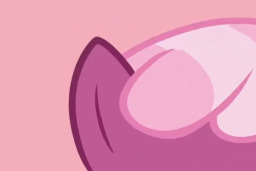
Chapter 1
When class began on his first day in Ponyville, he waited at the back of the room until she told him to come to the front. The other foals watched him, but he looked only at her. The pink hairs of her mane looked soft, and under them, against the reddish-purple of her coat, he noticed for the first time the white petals and yellow center and green stem. One colt looked out the window at the gray autumn sky. Fillies whispered to each other. A trio of older colts glowered at him. His lip trembled as he looked at the class. He looked back at her, and he saw her smile and the daisy again, and his cheeks flushed. He looked at the class again, and he said his name and that he had just moved from Baltimare.
The mud was cold and slippery when they pushed him in. He slid his whole body length, and the mud clogged his ear. He slid over a slug and it felt slimy. When he stood, the mud clung in little balls to his mane, and the yellow goo that remained of the slug was matted in his coat. The colts laughed at him and left. He slunk around the schoolhouse the long way. She was inside. Through the window, he watched her grading papers. She looked up once. She had no daisy behind her ear and didn’t see him. When he got home, his mother scolded him for playing in the mud. He said nothing, and he stayed in the warm bath with his toy boat for a long time.
The mud squelched and sucked at his hooves when they pushed him. He lost his balance and rolled as he fell. The mud was cold and slippery again. Twigs and leaves stuck in his coat, and they laughed. He took the long way around the schoolhouse. She saw him and called out the window for him to come, but he froze. She went to him and asked, “What happened?” He said he slipped and was going home. “Did anything else happen?” He saw she wore no daisy and shook his head. She pursed her lips but said nothing. He looked away. At home, his mother scolded him again.
He didn’t fall when they pushed him, but they pushed him again until he fell. The mud was thick and almost frozen, and he didn’t slide. One of them flung mud at his face. He shut his eyes, but when he opened them again, flecks of dirt got in, and they stung and made him cry. They laughed. Another one mimed his fall, crossing his eyes and twisting his mouth, and they laughed more. The third pretended to cry, and they laughed harder. They had their back to the schoolhouse and didn’t see her coming. She bellowed their names, and they screeched and cowered. In her angry teacher voice, she said she would talk to their parents. She told them to go, and they scattered like gnats. She got him up out of the mud and walked him home. He plucked a daisy from the side of the road and offered it to her. It had flecks of mud on the stem where he had touched it. She put it behind her ear, and only a little mud got in her mane. She smiled at him, and his cheeks flushed again, but he strutted as they walked side-by-side. At home, his mother told him to take a bath. He sailed his boat around the tub while she talked to his mother.
When his parents invited her to dinner, she wore no daisy. He showed her his boat. It was made of wood and painted blue and white, and he had gotten it for his birthday. He had asked to bring it to school, but his parents had said that wasn’t allowed. She looked at it and said, “That’s a nice boat you have.” He said it was his favorite toy but she could play with it if she wanted. “Thank you! But I have to have some grown-up talk with your parents first.” At the dinner table he sat next to her. He brought his boat. His father told him to put the boat away, but he said no and put it on the table next to his and her plates. His mother said the same thing, and he made an angry wordless growl and clutched the boat. They let him put it in the middle of the table. He couldn’t reach it from his seat, but he made sure she could if she wanted.
All dinner he looked at the empty place behind her ear. After dinner, his mother told him to go and play with his boat. He shook his head. His mother asked if he was still hungry, then if he wanted more dessert. He shook his head both times. She smelled like sweet cherries, and her mane still looked soft, and she smiled at him. In her kind teacher voice she said the grown-ups were going to have more boring grown-up talk. He got down from the chair and took his boat. He stayed by the table while he played. Before she left, he offered her the boat again. She played with it, but only for a few seconds, and she looked at him, not at it. After she left, he sat by the hearth and thought, holding his boat but not playing.
The class went outside. She took her lunch out of a brown paper bag. He was still in his seat. She said, “Is there something wrong?” It was not the voice she used for grown-up talk. There was no daisy behind her ear, only empty space and the hairs of her mane curling around her temple. But behind her ear didn’t look empty to him anymore, and his cheeks weren’t flushed. He shook his head and went outside, and he ate lunch under the warm sun.


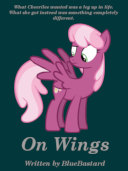




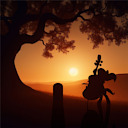
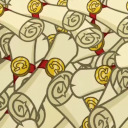

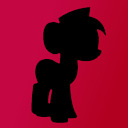
That was nice!
Boat!
derpicdn.net/img/view/2018/7/22/1786787.png
Source.
(Edit: turns out that boat played a much larger role in this story than I expected.)
Good.
Justice will be served!
Time to fix that.
Good story!
I enjoyed reading it.
Even if I have to admit I didn't fully understand the ending.
This one left me with a lot of questions. But hey, isn't that the point of this kind of story? I found this really sweet! I wish I had a teacher like Ms. Cheerilee growing up...
Is the narrative style meant to evoke Benjy Compson from The Sound and the Fury?
11939418
No. While The Sound and the Fury is one of my favorites, Benjy's section has sudden shifts in time and place as events in the present remind him of the past, and I feel like that makes it quite personal. This story, by contrast, is completely linear, told by a third-person narrator who follows the colt closely but never looks inside the his mind.
The style of this story was actually inspired by the very beginning of Joyce's A Portrait of the Artist as a Young Man, which describes Stephen Dedalus's early childhood and has some stylistic resemblance:
Joyce uses this style because Stephen is so young that he has only limited comprehension of the world. (The reference to bedwetting puts him around three or four years old.) I was inspired by this to try not letting any character interpret the story's action at all. The overall effect is quite different, because when young Stephen does have an opinion, Joyce shares it:
whereas I don't:
The scenes of the bullies pushing the colt into the mud are also derived from Joyce:
In my mind, the event of being pushed into something cold and dirty merged with the idea of not seeing into any character's thoughts, and the result was this story.
Ah, should've seen the parallels with Portrait, which I also love. Even though there’s no playing with temporality or first-person perspective, there are several reasons that I interpreted the protagonist as being like Benjy:
1. He seems to be at an earlier stage of cognitive development than Cheerilee’s foals generally are. Though he’s verbal, unlike Benjy, the thoughts he expresses are extremely simple. You do specify that he’s younger than at least some of the other foals, but his thoughts and actions are more along the lines of a five-year-old’s.
2. The colt evokes the same sort of plant imagery with Cheerilee that Benjy does with Caddy (he takes comfort in her smelling like trees, which he implicitly ties to her nurturing nature).
3. I thought there must have been a “reason” for the colts to bully him other than that he’s the new kid. It would make a certain amount of perverse sense for him to be bullied for being developmentally disabled. Ponyville would not have the resources for separate special ed classrooms, and it seemed like his parents were ignorant of his needs and desires, whereas he responded positively to Cheerilee’s affirmations of his personhood.
11940062
Yes, I did intend him to be young, around five or six (in human years). At such ages, children have thoughts, but not complex thoughts, not even if they're smart children. Alas, we are not told his thoughts; we are told what he sees ("he noticed for the first time the white petals," "he saw her smile and the daisy again") and what his body feels ("The mud was cold and slippery," "the warm bath"), we can infer some of his thoughts ("he strutted as they walked side-by-side," "he made an angry wordless growl and clutched the boat"), and occasionally, the narrative could be interpreted as a glimpse into his thinking ("he made sure she could if she wanted," "the empty place behind her ear"). But I tried to make sure we almost never see his thoughts directly. (I made an exception for "behind her ear didn’t look empty to him anymore," which is definitely telling us one of his thoughts.)
(Alas, I just caught a mistake! In the second bullying scene, I said he "wished she wore a daisy," which is precisely the kind of peek into his thoughts I wanted to avoid. I've modified it.)
Not having any access at all to any character's thoughts is unusual and makes it difficult to interpret the story. It would certainly explain some things if the colt is developmentally disabled. But it's also possible that he's physically disabled (for example, maybe he has an artificial limb) or is small for his age or has a prominent birthmark or has an unusual accent or is socially awkward or even is completely normal. Bullies don't need a good reason to bully someone, and we're never given an explanation. We don't find out what his parents think, either. Did his mother scold him because he's played in the mud before? Did he say nothing about being pushed because he was intimidated by the older colts, by his mother, by both, or for some other reason? We don't learn how much time there is between the first and last scenes, either. The whole story might happen over a few days or a few months. You can try to infer something about timing from the weather, but the only clues are that the mud was "cold and slippery" the first time and "thick and almost frozen" the last time (but was that a change of weather or a change of seasons?) and that, in the final scene, he eats lunch under "the warm sun" (but when is the sun not warm?).
My most direct inspiration for the daisy was the bridal veil that Cheerilee wears in S2E17 ("Hearts and Hooves Day"), which has a flower design on either side of the headband. You're right that it evokes Caddy smelling like trees. But Benjy wasn't in my mind when I was writing; if he had been, the bullying scenes might have been filled with "he hit and the other hit" instead.